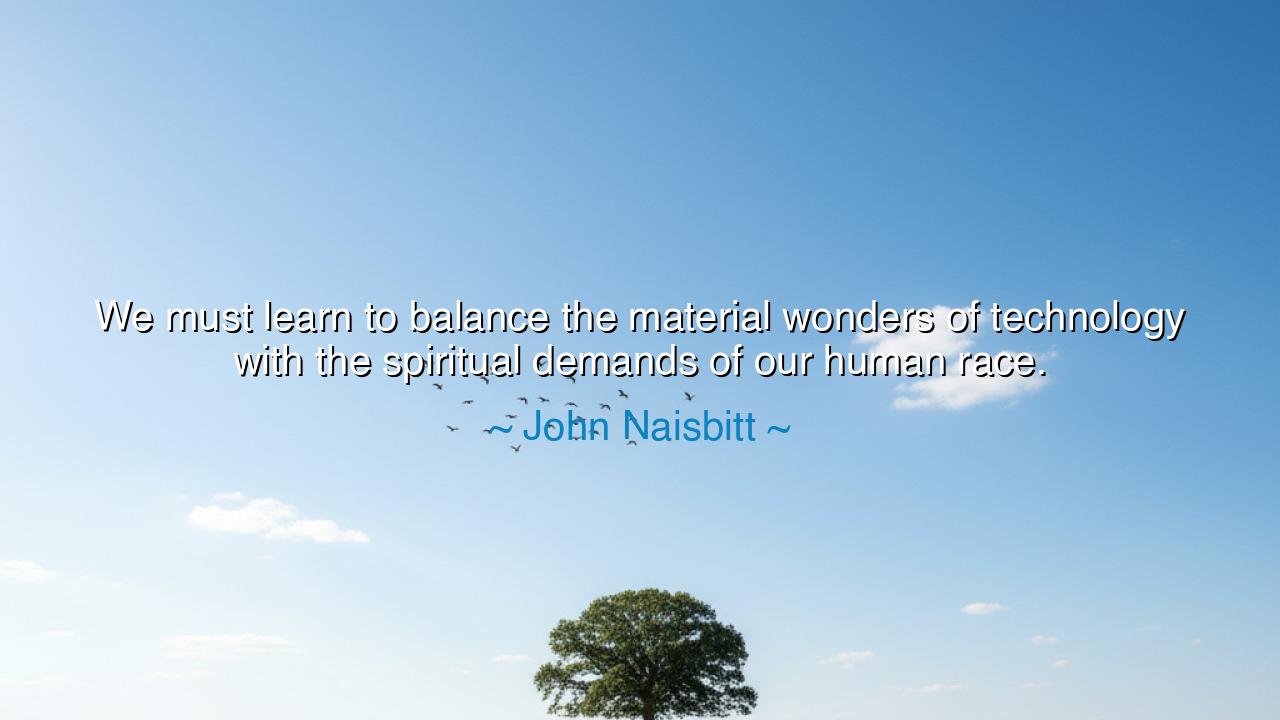
We must learn to balance the material wonders of technology with
We must learn to balance the material wonders of technology with the spiritual demands of our human race.






Hear the wisdom of John Naisbitt, who declared: “We must learn to balance the material wonders of technology with the spiritual demands of our human race.” In this saying lies a truth both ancient and eternal, for mankind, dazzled by its inventions, often forgets that the soul too requires nourishment. The machines we create may lengthen our days, may lighten our labor, may even reach into the stars—but if we neglect the heart, the spirit, the bonds that tie us to one another, we shall find ourselves rich in tools but poor in meaning.
The heart of Naisbitt’s reflection lies in balance. The marvels of technology are undeniable; they are the gifts of fire stolen from the heavens, of lightning bent to our will, of the atom split, of the computer’s infinite memory. Yet for every triumph of the mind, there must be an answering triumph of the spirit. Without spiritual depth—without compassion, wisdom, and reverence—our machines become weapons, our networks become chains, and our progress becomes a hollow crown. Thus, balance is not a choice but a necessity, the fulcrum upon which humanity’s survival rests.
The ancients, too, knew this tension. In the story of the Tower of Babel, men sought to climb the heavens with their own hands, building higher and higher with stone and invention. But their pride fractured them, scattering their voices across the earth. The lesson was clear: ambition without humility, creation without spiritual grounding, leads to division and downfall. Naisbitt’s words echo this truth for the modern age, where skyscrapers and satellites replace the tower, but the danger of imbalance remains the same.
History gives us other examples. In the Industrial Revolution, machines roared, cities swelled, and wealth multiplied. Yet in the shadow of those engines, children labored, families suffered, and the poor drowned in misery. The material wonders of steam and steel brought power, but without balance, they also brought cruelty. Only when societies began to pair progress with compassion—through education, reform, and the recognition of human dignity—did the revolution bear fruit that nourished all, not just the few.
And what of our own age, where technology strides faster than ever before? We speak across oceans in an instant, we carry libraries in our pockets, we create images and worlds with the press of a button. Yet loneliness grows, division deepens, and the inner life withers for many. We risk becoming like the hollow men of T. S. Eliot’s lament—full of data but empty of wisdom. Naisbitt’s warning is clear: if we do not tend to the spiritual demands of love, meaning, and moral vision, our glittering machines will not save us. They will only magnify our emptiness.
The lesson, O children of the future, is this: cherish the wonders of technology, but do not worship them. Use them to serve life, not to replace it. Let your days be filled not only with screens and circuits, but with silence, with reflection, with kindness freely given. For the strength of humanity lies not in the tools we build, but in the values we carry into every age. If balance is lost, the soul of our race will falter, no matter how great our machines become.
Practical counsel is this: set aside time daily to be free of your devices, to be present with your thoughts, your family, your community. Let technology serve your purposes, but do not let it rule you. Remember to feed your heart with beauty, with music, with prayer or meditation, with acts of service. In this way, you honor both the body and the soul, both the material and the eternal.
So let Naisbitt’s words endure as command and prophecy: “We must learn to balance.” For only in this balance will we find wholeness. Only in this union of progress and spirit shall humanity not merely survive, but truly flourish, standing tall not only for what it has built, but for the wisdom with which it has chosen to live.






AAdministratorAdministrator
Welcome, honored guests. Please leave a comment, we will respond soon